- Home
- Cody Goodfellow
All-Monster Action!
All-Monster Action! Read online
Praise for
Cody Goodfellow
&
ALL-MONSTER ACTION!
“ALL-MONSTER ACTION! is hilarious, action-packed, and way too much fun. Over-the-top and wild! Highly recommended.”—JONATHAN MABERRY, New York Times Bestselling author of Dust & Decay and Assassin’s Code
“A tour-de-force! Goodfellow's latest is his best yet. Compulsive, breakneck reading!”—BRIAN KEENE author of The Rising and Ghoul
“This is your chance. You only think you're hip—but you haven't read this Cody Goodfellow book, so you're not yet. Now you can be hip, and read something crazy entertaining too. You can't go wrong, man, I'm telling you. You’ve got to read this thing. I mean, if a book rocks, it rocks, that's all.”—JOHN SHIRLEY, author of A Song Called Youth
“In terms of sheer scope of over-the-top outrageous imaginings--something that they'll NEVER be able to afford the special effects budget to film and if they did it'd make Michael Bay say, ‘Dude, too much!'—ALL-MONSTER ACTION! utterly takes the cake.”—THE HORROR FICTION REVIEW
“Cody Goodfellow's writing etches itself inside your eyelids and chases your brain back into the dark corners where you can't escape. ALL-MONSTER ACTION! has more high concepts in a paragraph than a whole summer of blockbusters: a mad scientist who's passed on like the flu; biotech mutants harvested for fun and profit; and a giant monster arms race that ends in a showdown on the moon. This book is a human's-eye view of the future coming down hard on us, like a Tokyo resident gazing up at the sky and seeing only the outline of a giant foot.”—CHRISTOPHER FARNSWORTH, author of Blood Oath and The President’s Vampire
“ALL-MONSTER ACTION! is a dirty bomb right to the cerebral cortex—it's sharp, smart, scary, scarring, sexy and brutally funny. And like any good bomb, it's got specific targets in mind: Genre and gender, racism, colonialism, ageism and classism. ALL-MONSTER ACTION! demonstrates again that Cody Goodfellow is some kind of mad-ass genius.”—LISA MORTON, author of The Castle of Los Angeles and Monsters of L.A. and Four-Time Winner of the Bram Stoker Award
“One of the most unique and creative works I've ever read. The author is quite obviously insane, but like Colonel Kurtz, he's got a plan. ALL-MONSTER ACTION! is packed with wild, driving energy that carries the reader along like an out-of-control Disney ride. Cody Goodfellow combines genres and crazed pop-cult tropes with finesse and style. Old Mr. Yeats kept bitchin’ about ‘the centre cannot hold.’ Bullshit. With ALL-MONSTER ACTION! Cody Goodfellow proves he can hold the center together and play lead guitar at the same time. Filled with crazed, strange characters drawn from pop-cult, z-grade cinema and zillions of comic books, the pace is frantic and the imagery often makes you laugh while you cringe. What impresses me most with ALL-MONSTER ACTION! is Cody's ability to take cultural icons and clichés and turn them into a funny, intelligent, satiric story that perhaps Max Ernst would have written if he fronted Black Flag. ALL-MONSTER ACTION! made me remember those late nights as a kid, watching amazingly strange films and thrilling to every minute. Cody Goodfellow must have caught those films, too, because his fevered stories have one foot in the past and one foot in the present. Reading ALL-MONSTER ACTION! gave me the same pleasure as the first time I saw ‘The Navy vs. the Night Monsters.’ Brilliant!”—RICKY LEE GROVE, The Greatest Character Actor Ever (Army Of Darkness, Point Break, Scanner Cop) and the Pizza Delivery Man in Your Mom's Recurring Wet Dreams
“Cody Goodfellow’s imagination is a freeway flyer, and his prose is a ride on a rocket-sled. He’s one of the two or three god-damned best writers in the Genres today.”—MICHAEL SHEA, World Fantasy Award-winning author of Nifft the Lean and Copping Squid
“Cody Goodfellow’s work is ‘80s vintage horror with a contemporary edge. An exemplary wordsmith, his prose sticks a needle in your brain and gives it a twist. This stuff is Lovecraft on acid.”—LAIRD BARRON, author of The Imago Sequence & Other Stories
“Cody Goodfellow is a force to be reckoned with.”—NORMAN PARTRIDGE, author of The Man With the Barbed-Wire Fists
“Goodfellow is one of those writers whose voice sweeps you away like the undertow of a tsunami, and once you’re in, he’s got you pinned.”—MIKE ARNZEN, author of Play Dead
“Goodfellow’s fiction has the otherworldliness of Lovecraft, the sarcasm of Joe R. Lansdale, the mojo of a Motley Crue tell-all and best of all it’s wrapped together with prose that would satisfy fans of high literature in horror.”—MONSTER LIBRARIAN
“Cody Goodfellow is untouched as a breathless reporter of violent action, relating it in hurtling prose full of striking and sometimes hilarious metaphors.”—STRANGE AEONS
“Cody Goodfellow is one of a kind. Highly Recommended!”—DARK DISCOVERIES
ALL-MONSTER ACTION!
Cody Goodfellow
Swallowdown Press
Portland, OR
Swallowdown Press
PO Box 86810
Portland, OR 97286-0810
WWW.SWALLOWDOWNPRESS.COM
ISBN: 1-933929-07-3
“Doorway To The Sky” originally appeared in A Dark And Deadly Valley (Silverthought Press, 2007), “Venus Of Santa Cruz” originally appeared in Lullaby Hearse #6 (2005), and Mighty Unclean (Dark Arts Books, 2009), “Wage Of Dinosaurs” originally appeared in Probing Uranus (CreateSpace, 2010), “Care & Feeding Of Sea Monkeys” originally appeared in Traps (Dark Hart Press, 2008), “Kungmin Horangi: The People's Tiger” originally appeared in Daikaiju! Giant Monster Tales (Agog! Press, 2005), “The Island Of Dr. Otaku” originally appeared in Monstrous: 20 Tales Of Giant Creature Terror (Permuted Press, 2009).
Copyright ©2012 Swallowdown Press
All Monster Action Copyright ©2012 by Cody Goodfellow
Cover art copyright ©2012 by Mike Dubisch
Interior art copyright ©2012 by Nick Gucker for “Coming Attractions” art and Mike Dubisch for “Our Feature Presentation” art
All rights reserved. No part of this book may be reproduced or transmitted in any form or by any means, electronic or mechanical, including photocopying, recording, or by any information storage and retrieval system, without the written consent of the publisher, except where permitted by law.
All persons in this book are fictitious, and any resemblance that may seem to exist to actual persons living or dead is purely coincidental or for purposes of satire or parody. This is a work of fiction.
Book design by Carlton Mellick III.
Printed in the USA.
Acknowledgements
First, a Brobdingnagian wave of gratitude, love and awed respect to Mike Dubisch, whose artwork is like a host of whip-wielding furies, always urging me to make it weirder.
Thanks for help with various facets of this book (and the life lived while writing it) to Robert Hood, Robin Penn, Ryan Thomas, John Everson, Bill Breedlove, Jarret Keene, Jeromy & Claudia Cox, Mike Heffernan, the Iliad Bookshop crew, Eraserhead Press, Adam Barnes, Rob Winfield, Steve Cordova, Curt Benedetto, Kristen Tinderholt, Matt Carter, Darius Shamir, Benji Gillespie, Jeff Conner, John Palisano, Zak Jarvis, Tom Lynch, Oscar Rios, Adam Niswander, Nick Gucker, Kelly Young, Eric Morgret, Martin Roberts, Aaron Vanek, Andrew Kasch, my funky Dutch uncle John Skipp… and enormous, Tokyo-crushing love and admiration for my unspeakably wonderful, unutterably long-suffering wife, Victoria.
Contents
Coming Attractions
Doorway to the Sky
Venus of Santa Cruz
The Wage of Dinosaurs
The Care & Feeding of Sea Monkeys
Our Feature Presentation
ALL-MONSTER ACTION!
Episode I—Kungmin Horangi: The People’s Tiger
Episode II—The Island of Dr. Otaku
Episode III—All Cities Attack!
Bonus Features
Wet Nurse
We Need to Make Things More Repulsive: The Early Sketches of Nick Gucker
For Millie, my grandmother;
And Megalon, my godfather.
Coming Attractions
Doorway to the Sky
Most of the boys were already drunk and swimming in the ocean by the light of the moon when Harry Truman cut into the Armed Forces Radio Big Band Program to announce that the Enola Gay had dropped a new kind of bomb on Hiroshima.
Sergeant Canute and Private Laslovic were tossing a baseball and arguing about the end of last week’s movie, which had been shipped without the final reel.
“Tellin’ you, kid,” Canute said, lobbing the ball at Laslovic, “that ape wasn’t headed for a happy ending.”
“Aw horsefeathers, Sarge!” The private snapped the ball out of his mitt and fired it back hard enough to bruise Canute’s palm through the leather. “They couldn’t shoot him down without killing the girl, and they just couldn’t kill her, could they?”
“Las, it ain’t a new movie.” Canute rubbed his hand, but held onto the ball until Laslovic calmed down. “I saw it twice when you were in short pants, and it always ended the same.”
“Maybe they fixed it,” Laslovic retorted. “I never saw it before, but I know they made another one. I seen the posters, so I figure I know how it turned out. He had a son with the dame, or how else would it be a little white ape?”
Canute dropped the ball. “You win, kid.”
“Jesus Christ! Japs!” Corporal Wheeler raced out of the commo hut and almost knocked the sergeant down, which would be no mean feat.
“Yeah, we heard, pal. Harry gave ‘em hell.”
“Not in Japan, Canute, here! There’s a Jap fighter wing on the prowl! Cherry, out on night patrol in the PBY, spotted them not two hundred miles north, headed our way.”
“Nuts!” Laslovic said. “There ain’t a Jap warship within five hundred miles of here.”
Canute shook his head. “They must’ve come from that carrier our boys sunk.” Word had come in that a 6,000-ton Jap auxiliary carrier was spotted out of the Marshalls. Nobody knew where she came from or where she was headed, but Navy torpedo boats out of Tarawa sank her about four hundred miles to the north.
“I got a fix on Cherry, but his radio went dead. He took so much lead, it sounded like they were making popcorn—and then the signal got all loopy. I think they got him.”
Nobody said anything for a moment. The unit hadn’t seen a single casualty in nearly a year, unless you counted malaria and cirrhosis, and everybody liked Lt. Cherry.
“They won’t come here, Sarge,” Laslovic said. “Nobody came here when the war was on, and it’s over for sure now, ain’t it?”
Wheeler slapped his forehead. “Thank you all the same, General MacArthur, but we’d better tell the Colonel—”
Canute pointed at the men sporting in the surf, a quarter mile down the short airstrip. “You go ahead and tell him, but he’ll just get in the way.”
“Well then, what do we do?”
Canute scratched his cockeyed lantern jaw. They could be looking to surrender, or they could be mad with rage and their crazy yellow notions of honor. “Douse the lights and have Smitty and three other guys dust off the fifty-cals and find some belts. If they’re looking for something to crash into, we’ll just let them roll by in the dark and none the wiser, ‘til they run out of fuel and drop in the drink.”
Laslovic pointed at the mountaintop. “What about them, Sarge?”
They all turned and looked. Wheeler moaned, “Ah God, it looks like a fucking Hollywood premiere up there.” The headhunters were having another rumpus.
“Somebody better go up there and tell them to put that fire out,” Laslovic said.
Wheeler asked, “Hey, Canute, do those cannibals have a radio?”
Canute took out a stub of cigar and lit it with a kitchen match. “Where the hell would they get a radio?”
“Somebody’s putting out from here, sir, and it sure isn’t English.”
Laslovic’s eyes got big. “Jap spies?”
Wheeler turned and ducked back into the commo hut. In a few moments, Tommy Dorsey’s “Indian Summer” was rudely squashed by warbling distortion and a hollow baritone voice chanting in a language that was not Japanese.
“It’s that witch doctor, ain’t it?” Laslovic asked.
“Afraid so,” Canute said. “Wheeler, go rustle up some Coca Cola, beer, smokes, razors, an axe, and a couple rifles.”
Laslovic broke in, “Sir, we’re not supposed to give them guns—”
“Not for them, nimrod, for us. And eighty-six that squawk-box.”
The hollow, booming voice followed him across the airstrip as he loped back to his tent, the sepulchral tones of Vailala Madness making him run.
He’d heard stories about this kind of thing. This was why the CO tried to keep them away from the natives, who were, after all, God’s children, and like children, prone to imitate their elders. The hijinx they got up to on that mountain had amused and slightly unsettled Canute before, but now, it clenched his guts with icy fists, because he knew they had no radio.
“Yumi paitim dua,” the airwaves said.
We knock at the door.
“Opim rot bilong kago.”
Open the road of the cargo.
“Kago kam hariap.”
Cargo comes quickly.
“Kago kam tunait.”
Tonight—
While Wheeler stocked a gift basket, Canute set Laslovic brewing coffee and monitoring the radio, and assigned himself the thankless task of trying to get Lt. Col. Shubert out of the surf.
They’d never had an air raid, not even a drill, and now, with the announcement that a single plane dropping a single bomb had opened up hell in Hiroshima, the war was surely all but over. But the Japs were unknowable in their motivations. Any race that could make suicide into an attack strategy had to be more insect than man, and with their hive kicked over, small wonder that the kill-crazy drones were coming out of the woodwork to die with their stingers in any available target. That they would––that they even could––come here seemed unimaginable.
The war had little use for their island when it rolled through this stretch of the South Pacific, almost two years ago. Now and again, a plane landed and refueled or sought repairs on its way to somewhere else. A junked Curtiss P-40 lay nose-down at the end of the landing strip where it crashed after coming in on fire from a naval engagement during the battle at Guadalcanal. A snapshot of the ground crew with Captain Eddie Rickenbacker hung above the radio, taken shortly before the mission where he and seven flyers ditched in the Pacific and were lost at sea for three weeks.
The island lay at the southern end of a meek archipelago of guano-streaked rocks in the vast blue void between the Solomons and the Phoenix Islands, where Amelia Earhart was said to have vanished. It was less than two miles long, and little more than a conical peak with hunched, shaggy shoulders of jungle and canyons so steep and twisted as to suggest the folds of a green hood rising out of the sea. Dense necklaces of coral reefs all around it made anchorage for anything larger than a PT boat all but impossible.
The Australians paved the airstrip, but abandoned it when the Japs took the south Pacific. They left behind a couple coastwatchers, who were never heard from again. If the Japs ever landed here, they never planted a flag, and in late ‘43, the Army set up a fighter squadron and radio station. The fighters were pulled forward for the final push on Japan, and only a service platoon with a few patrol pilots remained behind.
A tiny outpost, well out of the way of the war, and all the other ways of the world; it was the closest the Army would show to mercy, for nearly every man on it was shot to hell, and no good for harder duty.
Beside the airstrip, a row of Quonset huts, squad tents and a couple improvised sheds peered out through the greedy green, all but swallowed by aggressive creeping vines and dense stands of bam
boo. Where the jungle could not grow over the human works, it crumbled them: drumming rain, moss and fungus prying loose lumber and sheet metal, twisting apart the duck walks and the corrugated metal planks that floored the runway, reducing the iron to red powder.
It was a weird island, and so weirdly beautiful that even the Army couldn’t spoil it. The sole native predators were carnivorous plants and spiders the size of a big man’s hand. Giant crabs scuttled out of the sea to climb the palms and harvest coconuts. The sunsets could strike a man blind with lavish orgies of raw, pure color, striated bands of orange, gold and violet painting the fleeting illusion of even more remote and beautiful islands in the sky.
The natives lived on the far mountainside and shunned the Army camp like it was unhallowed ground. The CO had forbidden any contact with “God’s children,” but Canute quietly traded with them, Coca Cola, cigarettes and chipped beef for taro, yams and copra to offset the terrors of Turkey Surprise night in the mess tent.
Needless to say, Wheeler didn’t like the orders. “Why in hell do I have to go play air raid warden to the goddamned headhunters?”
Canute popped knobby knuckles and flexed gnarled forearms, wads of muscle frolicking under sunburned leather mottled with faded blue tattoos. It was all the explanation most soldiers needed. “You’re the only other noncom without whiskey on his breath.”

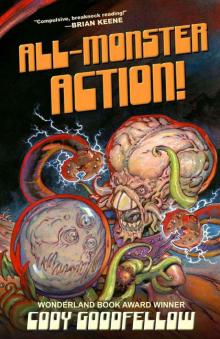 All-Monster Action!
All-Monster Action!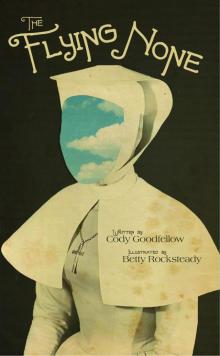 The Flying None
The Flying None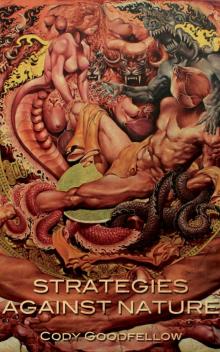 Strategies Against Nature
Strategies Against Nature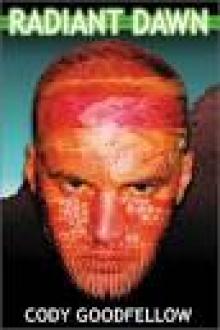 Radiant Dawn
Radiant Dawn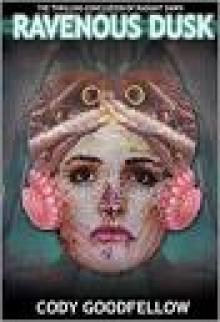 Ravenous Dusk
Ravenous Dusk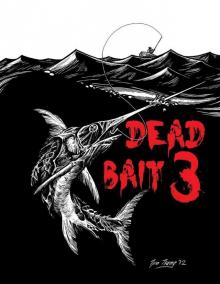 Dead Bait 3
Dead Bait 3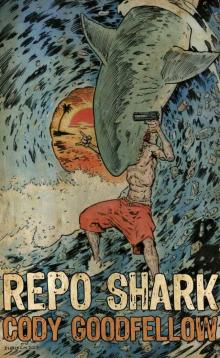 Repo Shark
Repo Shark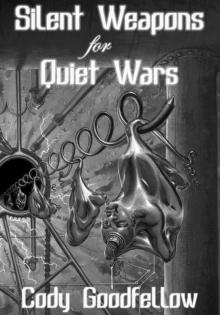 Silent Weapons for Quiet Wars
Silent Weapons for Quiet Wars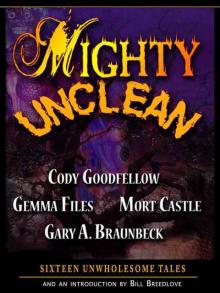 Mighty Unclean
Mighty Unclean